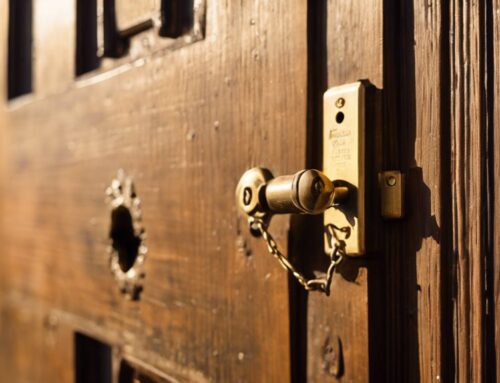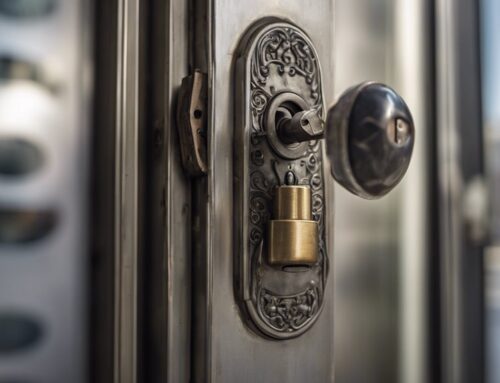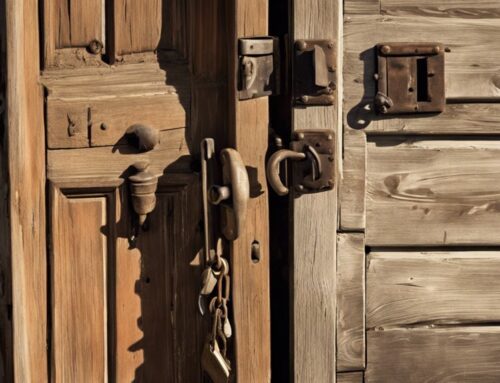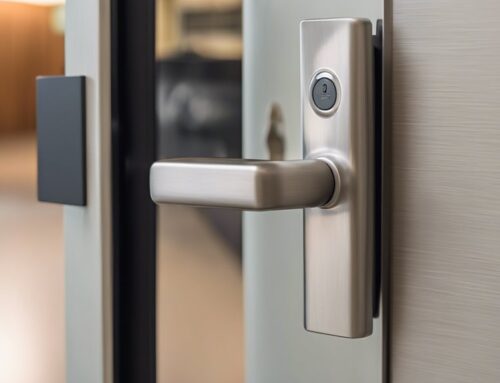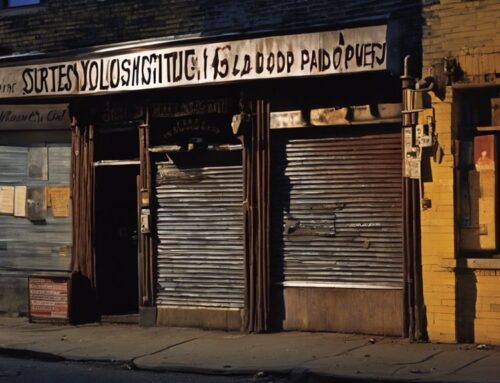In Pennsylvania, understanding lock picking laws can be essential if you're contemplating using or possessing lock picking tools. While it's generally legal to own these tools, the context in which you use them is what matters most. You need to be aware of the intent behind your actions and how local regulations may vary. If you're thinking about stepping into the world of locksmithing or simply want to know what's permissible, there are key aspects to reflect on that could impact your legal standing considerably. What do you think those might be?
Key Takeaways
- Possession of lock picking tools in Pennsylvania is generally legal without a license unless used with criminal intent.
- Using lock picking tools on someone else's property requires explicit permission to avoid legal consequences.
- Intent plays a significant role; mere possession isn't evidence of intent to commit a crime.
- No specific state-level locksmith license is needed but local regulations may apply, requiring potential permits.
- Ethical responsibility dictates that tools should only be used legally and respectfully, following best practices.
Legal Status of Lock Picking Tools

While the possession of lock picking tools in Pennsylvania is generally legal, it's important to understand the nuances of their ownership. The state lacks specific statutes regulating lock picking tools, which means you're free to own them without legal repercussions. This absence of laws allows you to possess these tools without needing any special licenses or permits.
However, legality hinges on your intent. You must ascertain that these tools are used for legitimate purposes, such as locksmithing, personal hobbies, or educational activities. For instance, lock picking tools are perfectly acceptable in practices that enhance skills, like in workshops or training classes. Additionally, it's crucial to recognize that some states have statutes requiring proof of legal intent, which may offer insight into best practices for ownership. In Pennsylvania, obtaining a locksmith license is not mandatory, but doing so can provide professional recognition and ensure compliance with industry standards. Operating as an unlicensed locksmith in Pennsylvania can lead to legal consequences, making it important to adhere to professional guidelines.
If you're a professional or a hobbyist, you can purchase these tools from recognized suppliers with no restrictions—just make sure they're legitimate businesses.
While you can use these tools on your own property, unauthorized use on someone else's property is illegal. So, always obtain explicit permission before working on any locks that don't belong to you.
To solidify your legal standing, keeping records of your purchase and usage can be beneficial in case questions arise.
Understanding Intent and Legal Implications

Understanding the intent behind your use of lock picking tools is vital for steering through Pennsylvania's legal landscape. While the state doesn't have specific laws prohibiting the possession of these tools, your intent becomes significant when determining legality. Possession alone isn't considered prima facie evidence of an intention to commit a crime. However, using these tools on a lock without the owner's explicit permission is illegal.
If you plan to use lock picking tools, be clear about your purpose. Possessing them with the intent to commit unlawfulness, such as breaking and entering, can lead to criminal charges, fines, or imprisonment. Conversely, using these tools for lawful activities—like hobbies or professional locksmithing—is permissible, provided you have the owner's consent. This consent not only shields you from potential legal repercussions; it also emphasizes the importance of respect for property rights. Moreover, possessing these tools without the intent to commit a crime can keep you in compliance with local laws regarding possession of tools.
To avoid complications, familiarize yourself with local law enforcement's interpretation of lock picking laws and guarantee compliance with state regulations. Documenting permission can serve as a safeguard in case of inquiries. In Pennsylvania, locksmiths are advised to take preventive measures to minimize risks, such as maintaining clear records and obtaining written consent from property owners before performing services. Additionally, locksmiths should be aware of their responsibilities and legal considerations during eviction procedures to ensure compliance and professionalism.
Always prioritize using lock picking tools for legitimate purposes, which aligns with the principles of freedom and respect for others' property. Being aware of potential penalties for unauthorized use also acts as a deterrent against unlawful activities.
Ultimately, understanding the nuances of intent is key to steering through the legal implications surrounding lock picking in Pennsylvania.
Locksmiths and Their Rights
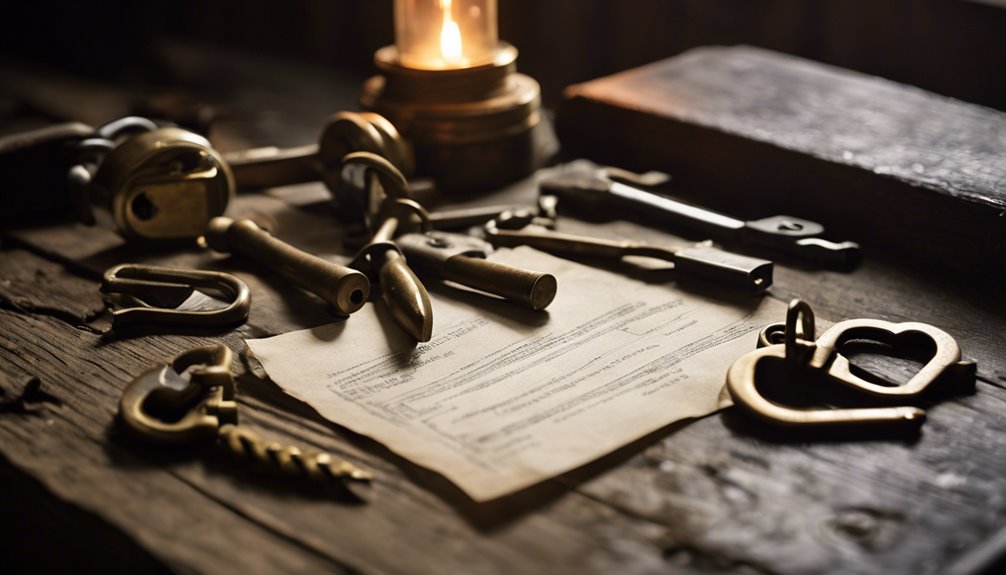
Locksmiths in Pennsylvania navigate a distinct set of rights and responsibilities that govern their profession. While the state doesn't require specific licensure for locksmiths, those engaging in over $5,000 annually in residential or commercial services must obtain a Home Improvement Contractors license. This license, issued by the Attorney General, necessitates proof of insurance and a physical mailing address, along with a nominal fee of $52 for a two-year period. Additionally, many states mandate licensing for locksmiths to ensure compliance with safety and security standards.
Moreover, maintaining insurance coverage is essential not only for compliance but also for safeguarding both the locksmith and the client against potential losses. Although there's no mandatory general liability insurance, it typically becomes a condition tied to the Home Improvement Contractors license, making it a significant aspect of operational viability. Locksmiths benefit from undertaking continuous education to remain competitive and informed about the latest industry trends and technologies. In Pennsylvania, understanding employment laws for locksmiths can enhance their awareness and compliance with both state and federal regulations, thus ensuring fair practices.
Locksmiths must also secure a valid business license, disclosing their physical address and any additional locations. While there's no mandated training or exams imposed by the state, adhering to local business regulations remains important.
Professional conduct is a cornerstone of the locksmithing trade. The Associated Locksmiths of America (ALOA) offers resources for promoting ethical practices. It's crucial you provide identification and proof of authority when requested by clients, as consumers have the right to seek verification of your credentials.
While not specifically monitored, consumer protection measures do exist for your profession, underscoring the significance of ethical behavior and accountability in your business. By upholding these regulations, you can help maintain the integrity of locksmithing in Pennsylvania.
Personal Use Guidelines

Possessing lock picking tools in Pennsylvania comes with specific legal guidelines that you need to be aware of to guarantee compliance. Under state law, these tools—including lockpicks and false keys—are legal to own as long as you don't intend to use them for unlawful purposes.
Ownership for personal use is acceptable, particularly when you're working on your own locks. The key factor in legality is your intent. If lock picking tools are found in your possession with the goal to commit a crime, you could face serious legal repercussions.
It's equally important that you have permission from the lock owner before using these tools on any lock that doesn't belong to you. If you own the lock, however, you can generally engage in personal use without needing extra approval. Compliance with essential lock safety standards in Pennsylvania ensures that property owners and locksmiths maintain safety and adhere to legal regulations.
Moreover, misusing lock picking tools or operating without proper consent can lead to criminal charges, fines, or even imprisonment. Pennsylvania law doesn't favor ignorance; being unaware of these regulations won't protect you from penalties.
It's essential to stay informed about local laws and regularly check both state and federal statutes to guarantee your compliance regarding lock picking. Familiarizing yourself with these personal use guidelines will help prevent unintended legal troubles related to your lock picking endeavors. Additionally, understanding the legal aspects of key duplication in Pennsylvania can ensure that your locksmithing practices comply with state laws.
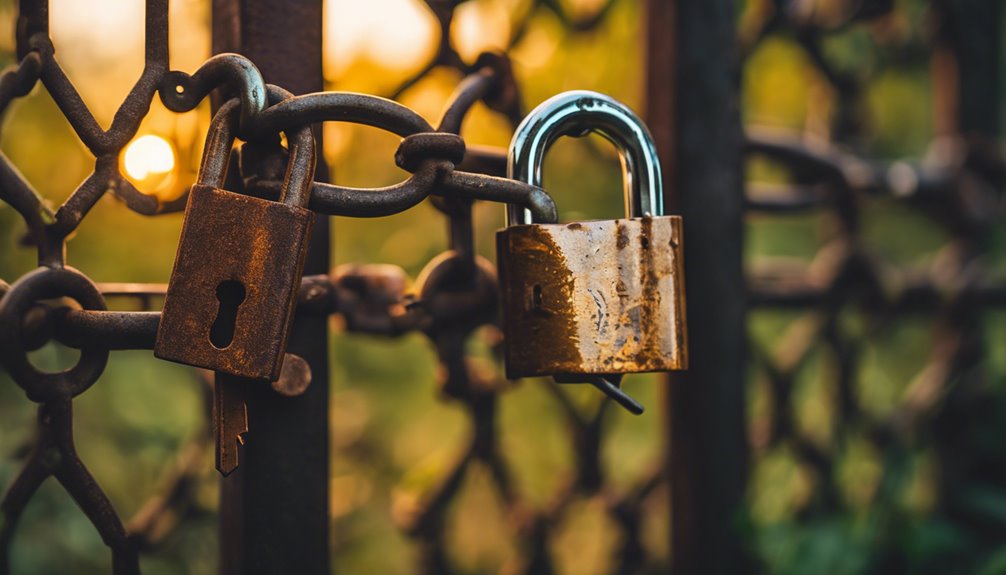
While you might think of lock picking as a harmless skill, using these tools without proper authorization can lead to serious legal consequences in Pennsylvania. The law distinguishes between possession of lock picking tools and their intended use. If you're caught using these tools for unauthorized entry, you could face significant penalties, ranging from misdemeanors to felonies. For individuals requiring emergency services, there are licensed professionals who can legally assist without violating the law.
Here's a quick overview of potential legal ramifications:
| Offense Type | Possible Penalties |
|---|---|
| Misdemeanor | Up to 1 year imprisonment + fines |
| 2nd Degree Misdemeanor | Up to 2 years imprisonment + fines $500-$5,000 |
| Felony Offenses | Varying terms, often harsher for repeat offenders |
| Trespassing | Additional charges + penalties for defying property rights |
It's essential to remember that unauthorized access to someone else's property is not just a minor infraction. Property owners have the right to control who enters their premises. If you attempt to pick a lock without explicit permission, you're opening yourself up to serious consequences. Intent plays a vital role; possessing lock picking tools with the intention to commit a crime can lead to legal actions under broader burglary and trespassing statutes. In foreclosure processes, locksmiths play a critical role by ensuring legal entry and maintaining the integrity of the property.
Compliance With Regulations
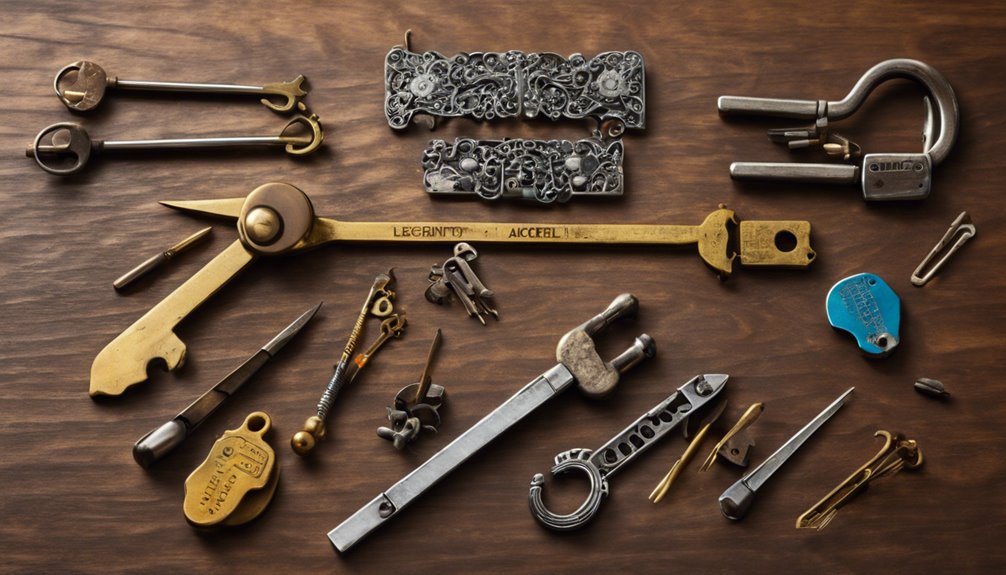
When traversing Pennsylvania's lock picking regulations, you'll need to guarantee general law compliance and adherence to ethical standards. Understanding local licensing requirements is also essential for legal operation. Staying informed about these factors helps mitigate risks and maintain a lawful practice in the locksmith industry. Additionally, pursuing locksmith apprenticeships in PA provides valuable hands-on experience and can enhance your career prospects in the locksmith field. It's important for Pennsylvania businesses to ensure their security measures meet state guidelines, especially when it comes to the installation of high-security locks.
General Law Compliance
Guaranteeing compliance with regulations is essential for anyone involved in locksmith activities in Pennsylvania, especially given the varying local laws. While owning lock picking tools is generally legal due to the absence of substantial state laws, the key factor is how you use them. Engaging in unauthorized access using these tools is illegal and could lead to severe consequences. Intent matters greatly; using lock picks without the property owner's permission is a criminal offense. If you're a locksmith, remember that while there's no state licensing requirement, performing over $5,000 in work per year necessitates a Home Improvement Contractors license. This requires proof of insurance and a physical mailing address, along with a modest fee. Additionally, local regulations may impose additional requirements, such as background checks. Certified technicians are crucial for ensuring quality and safety compliance in locksmith services across Pennsylvania. Locksmiths should stay informed about digital lock regulations as they continue to evolve, impacting both the tools used and the methods employed in the field. Lastly, guarantee adherence to safety regulations, including those set by OSHA, to maintain a safe working environment. Non-compliance not only jeopardizes your freedom but also impacts your ability to operate within Pennsylvania's legal framework. Stay informed about both state and local regulations to navigate these laws effectively and safeguard your locksmith activities.
Ethical Standards Adherence
Steering through the ethical landscape of lock picking in Pennsylvania requires a firm understanding of both legal requirements and ethical standards.
While possessing lock picking tools isn't illegal, your intent matters considerably. You must demonstrate that your possession isn't connected to illegal activities. Lock picking is permissible only on locks you own or with explicit permission from their owners. Failing to obtain such permission could result in serious legal repercussions, as unauthorized entry is a criminal offense.
Moreover, confidentiality plays an important role in ethical lock picking. Safeguarding your skills and tools from unauthorized individuals helps maintain community safety and prevents misuse.
Practicing ethical responsibility means using your abilities solely for lawful purposes, ensuring you don't infringe on someone else's privacy or property rights.
As you navigate these regulations, it's vital to align your actions with both legal statutes and ethical standards. Secure storage of your tools and clear communication with property owners about your intentions reinforce your commitment to responsibility in this field.
Businesses must also ensure that their security systems are ADA compliant, which includes making sure that locks and access points are accessible to individuals with disabilities.
Local Licensing Requirements
Local licensing requirements for locksmiths in Pennsylvania are relatively straightforward, yet they necessitate a thorough understanding of both state and local regulations.
At the state level, you won't need a specific locksmith license, but if you earn more than $5,000 annually, you must secure a Home Improvement Contractor's license. This license, managed by the Attorney General's office, requires a physical mailing address and proof of insurance, costing $52 for a two-year period.
While there are no statewide local licenses required, regulations may vary by county or municipality. For instance, cities like Philadelphia don't mandate specific local licenses, but nearby areas might've different requirements. You may need local business tax receipts and sales tax certificates to operate.
While criminal-background checks aren't required by state law, local jurisdictions might impose them. Additionally, compliance with general business licensing regulations is necessary to avoid penalties.
Although there are no specific state requirements for liability insurance related to locksmith activities, some local jurisdictions may require it. This underscores the importance of being aware of both state and local compliance to ascertain you're operating legally and freely.
Seeking Legal Advice
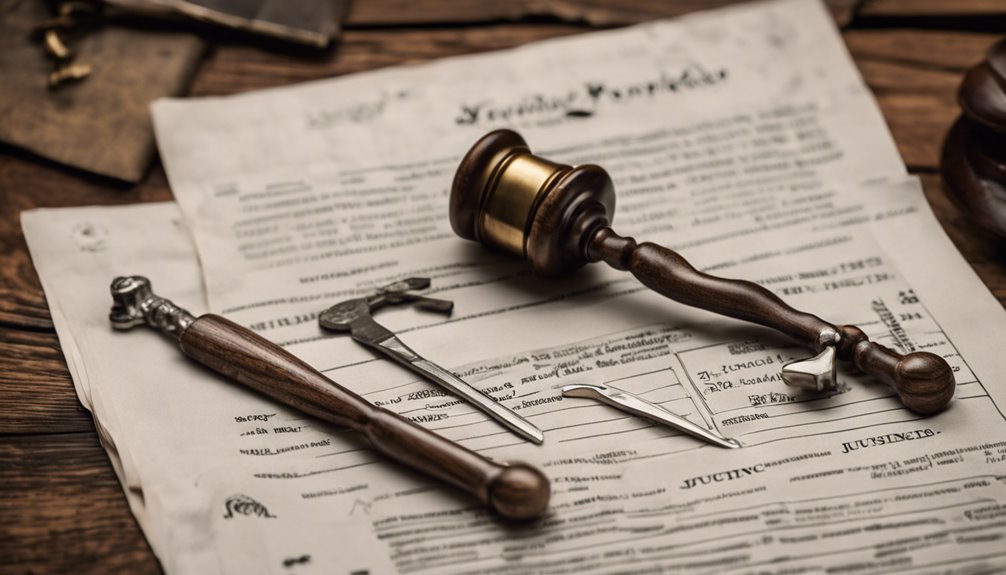
How can you navigate the complexities of Pennsylvania's lock picking laws? Understanding these laws is vital, especially since the legality of possessing and using lock picking tools hinges on your intent.
Given that possession is legal unless it's tied to illicit activities, the nuances of your situation matter. If you're unsure, consulting with legal experts is a proactive step.
Before purchasing or using lock picking tools, you must familiarize yourself with both local and federal regulations. Legal counsel can help clarify any grey areas regarding your specific circumstances.
They can guide you through the implications of using these tools, especially concerning permission from property owners. Remember, even practices that appear innocuous may lead to serious legal consequences without explicit authorization.
Additionally, locksmith supply stores and online retailers can provide helpful resources on local statutes. Their insights might inform you about prevalent legal interpretations and best practices.
Regularly checking relevant laws is also important, as legislative changes can affect how lock picking is regulated in your area.
Ultimately, informed decisions about legal compliance can empower you to enjoy this skill responsibly. When in doubt, it's always smarter to err on the side of caution.
Good legal advice not only protects your freedom but also guarantees that your interest in lock picking remains a legitimate pursuit.
Frequently Asked Questions
Are There Any Restrictions on Selling Lock Picking Tools in Pennsylvania?
You won't find any restrictions on selling lock picking tools in Pennsylvania.
The state doesn't regulate the sale, possession, or transfer of these tools, meaning you're free to buy and sell them without limitation.
However, always verify your intentions are lawful, as using the tools for illegal purposes can lead to serious consequences.
Staying transparent and ethical in your transactions helps you avoid any potential legal troubles stemming from misuse.
Can Minors Possess Lock Picking Tools Legally?
Picture a young inventor, tinkering with gadgets and tools, enthusiastic to discover new possibilities.
In Pennsylvania, minors can legally possess lock picking tools as long as they're not for unlawful purposes. The intent matters most; you can hone your skills, fostering creativity, but using them without permission can lead to serious consequences.
Engage with your passion responsibly, ensuring you're within legal boundaries, and you'll navigate your path without falling into trouble.
Is Participating in a Lockpicking Competition Legal?
Participating in a lock picking competition is legal, as long as you don't intend to use your skills for criminal purposes.
Make sure you have explicit permission from the property owner for any locks used. It's also important to conduct the event transparently and remain compliant with any local laws.
Avoid any implications of offering locksmith services without a license, and always keep your activities lawful and well-documented.
Imagine you're locked out of your own home, desperately trying to regain access.
If you use lock picking tools without authorization, you could face serious penalties.
In many cases, it's a misdemeanor of the third degree, risking up to a year in jail and fines starting at $250.
For more severe offenses, you could face two years and fines between $500 and $5,000.
These consequences can haunt your future, impacting employment and reputation.
Do I Need a License to Teach Lock Picking as a Hobby?
You don't need a license to teach lock picking as a hobby. Since there's no specific law requiring it, you're free to share your knowledge.
Just make certain you're not intending to use these skills for criminal purposes. Always get permission from the lock owner before you practice.
While teaching doesn't have formal regulations, maintaining ethical standards is essential to avoid any potential legal issues down the line.
Conclusion
In steering through Pennsylvania's lock picking laws, think of your intentions as the key that reveals your legal safety. By understanding the distinction between lawful and unlawful use, you can avoid potential pitfalls. Remember, clear communication, ethical practices, and compliance with local regulations act as your roadmap. If you're ever uncertain, don't hesitate to seek legal advice. By staying informed and cautious, you can confidently handle your lock picking tools without running afoul of the law.





